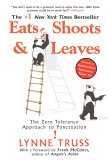Summary | Excerpt | Reviews | Beyond the Book | Readalikes | Genres & Themes | Author Bio

Critics' Opinion:
Readers' Opinion:
First Published:
Apr 2004, 240 pages
Paperback:
Apr 2006, 240 pages
 Book Reviewed by:
Book Reviewed by:
BookBrowse Review Team
Buy This Book
The reason it's worth standing up for punctuation is not that it's an arbitrary system of notation known only to an over-sensitive elite who have attacks of the vapours when they see it misapplied. The reason to stand up for punctuation is that without it there is no reliable way of communicating meaning. Punctuation herds words together, keeps others apart. Punctuation directs you how to read, in the way musical notation directs a musician how to play. As we shall see in the chapter on commas, it was first used by Greek dramatists two thousand years ago to guide actors between breathing points – thus leading to the modern explanation of why a cat is not a comma:
A cat has claws at the ends of its paws.
A comma's a pause at the end of a clause.
My dear Joe,I hope you are quite well. I hope I shall soon be able to teach you, Joe – and then we shall be so glad. And when I am apprenticed to you, Joe: what larks! Believe me, in affection,Pip
Reprinted from Eats, Shoots & Leaves by Lynne Truss by permission of Gotham Books, a member of Penguin Group (USA) Inc. Copyright © Lynne Truss, 2003. All rights reserved. This excerpt, or any parts thereof, may not be reproduced without permission.





The House on Biscayne Bay
by Chanel Cleeton
As death stalks a gothic mansion in Miami, the lives of two women intertwine as the past and present collide.

The Flower Sisters
by Michelle Collins Anderson
From the new Fannie Flagg of the Ozarks, a richly-woven story of family, forgiveness, and reinvention.

The Funeral Cryer by Wenyan Lu
Debut novelist Wenyan Lu brings us this witty yet profound story about one woman's midlife reawakening in contemporary rural China.
Your guide toexceptional books
BookBrowse seeks out and recommends the best in contemporary fiction and nonfiction—books that not only engage and entertain but also deepen our understanding of ourselves and the world around us.